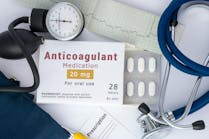NIH ACTIV Trial of blood thinners pauses enrollment of critically ill COVID-19 patients
Three clinical trial platforms working together to test the effects of full doses of anticoagulants (blood thinners) in COVID-19 patients have paused enrollment for one group of patients, reported the National Institutes of Health (NIH).
Among critically ill COVID-19 patients requiring intensive care unit (ICU) support, therapeutic anticoagulation drugs did not reduce the need for organ support. Enrollment continues for moderately ill hospitalized COVID-19 patients in the trials.
As is normal for clinical trials, these trials are overseen by independent boards that routinely review the data and are composed of experts in ethics, biostatistics, clinical trials, and blood clotting disorders. Informed by the deliberations of these oversight boards, all the trial sites have paused enrollment of the most critically ill hospitalized patients with COVID-19. A potential for harm in this sub-group could not be excluded. Increased bleeding is a known complication of full-dose anticoagulation. The trials are working urgently to undertake additional analyses which will be made available as soon as possible.
At the recommendation of the oversight boards, patients who do not require ICU care at the time of enrollment will continue to be enrolled in the trial. Whether the use of full-dose compared to low-dose blood thinners leads to better outcomes in hospitalized patients with less COVID-19 severe disease remains a very important question. Patients who require full-dose blood thinners for another medical indication are not included in these trials.
COVID-19 is associated with significant inflammation and clinical and pathologic evidence of widespread blood clots. These trials were launched because clinicians have observed that many patients ill with COVID-19, including those who have died from the disease, formed blood clots throughout their bodies, even in their smallest blood vessels. This unusual clotting can cause multiple health complications, including lung failure, heart attack, and stroke.
Three international partners have come together in an unprecedented collaboration resulting in a multiple platform randomized controlled trial. The three international trials include: the Randomized, Embedded, Multi-factorial Adaptive Platform Trial for Community-Acquired Pneumonia (REMAP-CAP Therapeutic Anticoagulation; Accelerating COVID-19 Therapeutic Interventions and Vaccines-4 (ACTIV-4) Antithrombotics Inpatient; and Antithrombotic Therapy to Ameliorate Complications of COVID-19 (ATTACC).
The trials which span four continents have the common goal of assessing the benefit of full doses of blood thinners to treat moderately ill or critically ill adults hospitalized for COVID-19, compared to a lower dose often used to prevent blood clots in hospitalized patients. To meet the challenge of this pandemic, investigators worldwide joined forces to answer this question as rapidly as possible. In the United States, the ACTIV-4 trial is being led by a collaborative effort with several universities, including the University of Pittsburgh and New York University, New York City.





